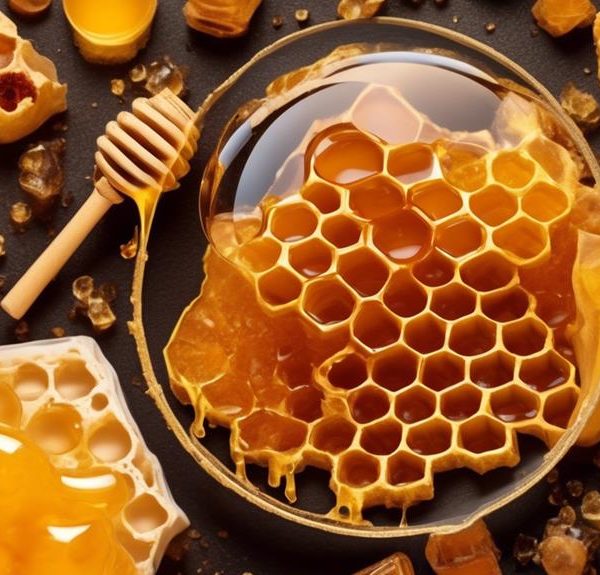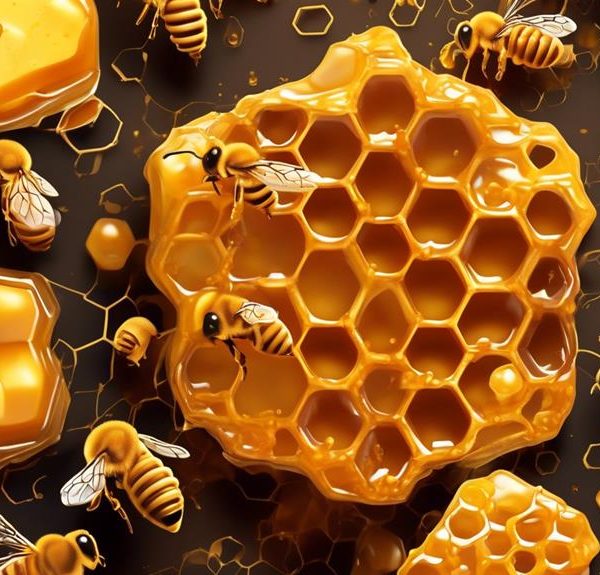An intriguing exploration into the caloric content of honey, revealing surprising facts that may make you rethink your next spoonful.

Are There Calories in Honey
You've probably finished an entire jar of honey without even thinking twice about what's in it. It's not just sweet, golden nectar produced by diligent bees, but also a fascinating source of nutrition that's been used for centuries.
But have you ever stopped to ponder how many calories are actually in honey? Well, it's high time we shed some light on this sweet mystery. By the end of this discussion, you'll see honey in a completely new light and maybe even second-guess that next spoonful you're about to consume.
Key Takeaways
- A tablespoon of honey contains around 64 calories, making it denser in calories compared to table sugar.
- Honey is rich in carbohydrates, primarily fructose and glucose, and should be consumed in moderation.
- Honey offers antioxidants, vitamins, and minerals not typically found in other sweeteners.
- While honey can be beneficial in various diets, it may not be suitable for low-carb or ketogenic diets due to its high sugar content.
Understanding Honey's Nutritional Content
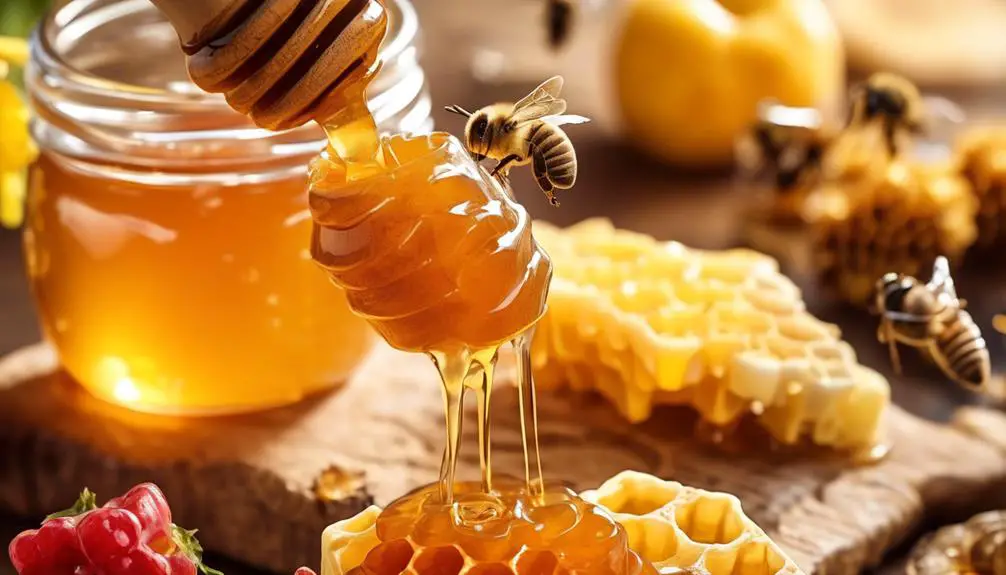
Frequently, you may not realize that honey, while sweet and delicious, also contains a significant amount of calories and unique nutritional properties. A tablespoon of honey contains roughly 64 calories, which is higher than the same amount of table sugar. It's a rich source of carbohydrates, primarily fructose and glucose, which are simple sugars that your body can quickly convert to energy.
Additionally, honey contains trace amounts of vitamins, minerals, and antioxidants. You'll find minute amounts of B vitamins, vitamin C, and minerals like calcium, iron, and zinc. The types and quantities of these nutrients can vary, however, depending on the flowers the bees visited for nectar. Honey's antioxidant content, which includes flavonoids and phenolic acids, also contributes to its nutritional profile. These antioxidants can help protect your body from harmful free radicals, which are unstable molecules that can cause damage to your cells.
Don't forget, though, that while honey does offer some nutritional benefits, it's still high in sugar and should be consumed in moderation. It's not a free pass to indulge, but a natural sweetener that you can use sparingly to add flavor to your food and drinks.
Calorie Count in a Spoonful of Honey
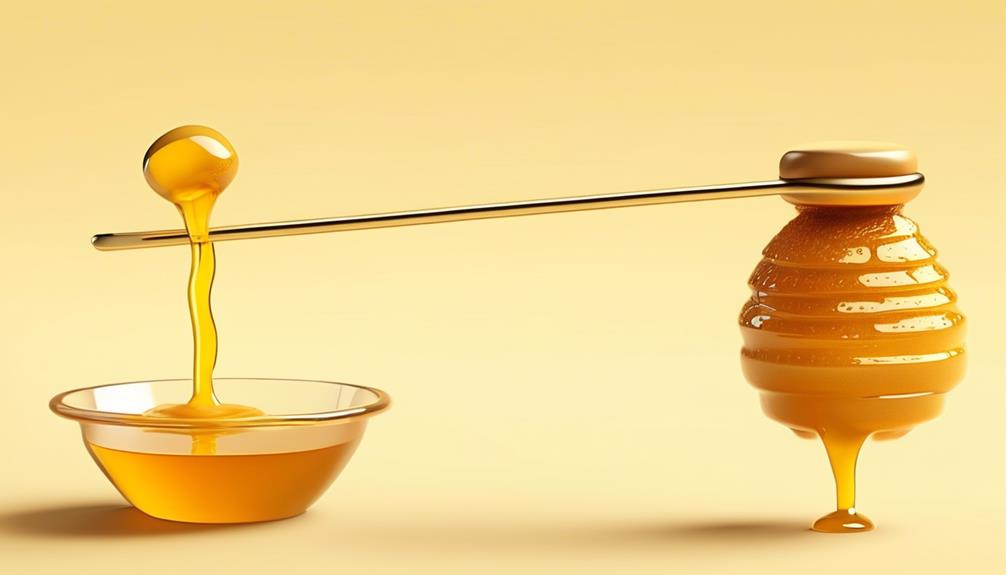
While you might enjoy the sweet taste of honey, it's important to remember that a single spoonful contains about 64 calories. This calorie count makes honey a potent source of energy, but it's also something to keep in mind if you're monitoring your daily intake.
Honey is a natural sweetener and is often used as a healthier alternative to table sugar. However, it's worth noting that it's denser in calories. A teaspoon of sugar has around 16 calories, whereas a teaspoon of honey has approximately 21. It's clear that while honey offers more nutritional benefits than sugar, it also packs more calories per serving.
While it's true that honey provides essential nutrients, including antioxidants, it's high in fructose, a type of sugar that can contribute to weight gain if consumed in excess. Therefore, it's essential to use honey sparingly, especially if you're on a calorie-controlled diet.
In essence, while honey is a healthier choice compared to refined sugars, it's crucial to consider its calorie content. Enjoy the sweetness and health benefits it provides, but remember to keep your portion sizes in check.
Comparing Honey and Other Sweeteners

Let's dive into how honey stacks up against other sweeteners in terms of calorie content.
When you're enjoying that delicious dollop of honey in your tea or spread on your toast, you might wonder how it compares to other sweeteners. Let's take a look at honey, sugar, and agave nectar.
Sweetener | Calories per tablespoon |
|---|---|
Honey | 64 |
Sugar | 49 |
Agave Nectar | 60 |
As you can see, honey has slightly more calories per tablespoon than sugar and agave nectar. However, honey offers more than just sweetness. It's full of antioxidants, vitamins, and minerals not found in other sweeteners.
Also, it's sweeter than sugar, so you'll likely use less of it. Agave, on the other hand, is less sweet than honey but contains more fructose, which may impact your blood sugar levels more than honey.
Honey in Different Diets
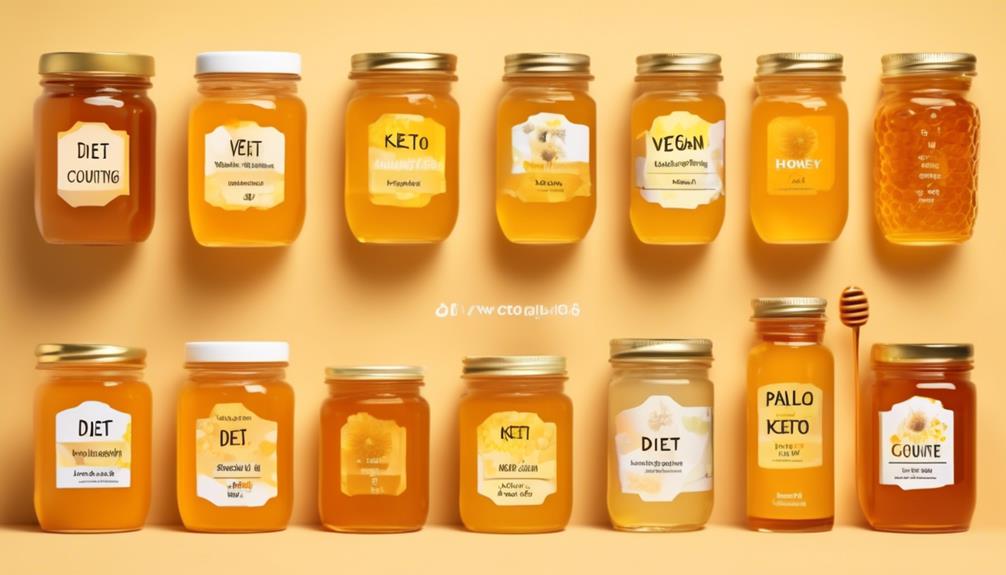
Given the calorie content and nutritional profile of honey, you might be curious how it fits into various dietary plans. In truth, it's a versatile food that can be incorporated into many diets, but it's not suitable for all.
Let's start with the most common dietary plans. If you're following a balanced diet, honey can be a great natural sweetener. It's high in antioxidants and can provide a healthier alternative to refined sugars. However, it's still high in calories and sugar, so moderation is key.
For those on a low-carb or ketogenic diet, honey is typically avoided due to its high sugar content. Although it's a natural source of sugar, it can still spike blood sugar levels, which isn't ideal for these diets.
If you're vegan, honey is a controversial topic. While it's a natural product, it's produced by bees, so some vegans choose to avoid it.
For those on a Paleo diet, honey is generally accepted as it's a natural, unprocessed food. But again, due to its high sugar content, it should be consumed in moderation.
Thus, although honey has many health benefits, its suitability largely depends on the dietary plan you're following.
Potential Health Benefits of Honey

You may be surprised to learn that honey, beyond its sweetness, packs a plethora of health benefits. It's rich in antioxidants which can help lower blood pressure. These antioxidants have been linked to reduced risk of heart attack, stroke, and some types of cancer. They may also promote eye health.
Honey can also help improve cholesterol levels. High levels of LDL or 'bad' cholesterol increase the risk of heart disease. Studies show that honey can lower LDL cholesterol while significantly raising HDL, the 'good' cholesterol.
Another benefit you may appreciate is its ability to help with weight management. Honey is less likely to cause weight gain compared to refined sugar, making it a healthier alternative.
However, it's not just about physical health. Honey can also soothe a sore throat. It's an effective cough suppressant, and it's often used in treating upper respiratory infections.
Remember though, while honey has many potential health benefits, it's still high in calories and should be consumed in moderation. Adding honey to your diet can be beneficial, but it's not a magic cure. Always consult your doctor before making any significant changes to your diet.
Conclusion
So, yes, honey indeed has calories, with about 64 in a tablespoon.
While it's sweeter than sugar, it's also healthier, offering potential benefits like antioxidants and antibacterial properties.
However, remember it's still a form of sugar, so moderation is key.
Whether you're on a diet or simply mindful about your health, incorporating honey can be a wise choice.
Just keep an eye on your portions to ensure a balanced, healthy lifestyle.

